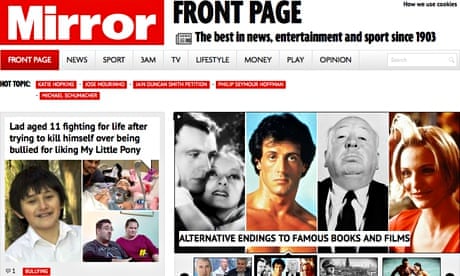Trinity Mirror's share price rose 6% in early trading on Tuesday on the back of a profit upgrade for 2013, after digital revenues leapt more than 30% in the final two months of 2013.
The publisher of the Daily Mirror and Sunday People saw its share price rise 10.5p, to 186p, at about 9.30am on Tuesday as investors reacted positively to an unexpected financial update for the year to 29 December.
Trinity Mirror said that adjusted operating profits for the year will now be ahead of expectations thanks to an improved trading performance in November and December, with total revenues down just 1% year on year, compared with a 7% decline in the first 10 months of 2013. In 2012 the company made adjusted pre-tax profits of just under £100m.
The company put this improvement down to 32% year-on-year growth in digital revenue in the final two months of 2013, along with growth in printing and "other" income substantially offsetting a marginal decline in circulation and print advertising.
Overall, digital revenues will now be up 3% year on year for the year, after a 3% decline in the 10 months to the end of October.
The 32% year-on-year increase in digital revenue continued through January, Trinity Mirror said, although overall revenues were down 4%.
Trinity Mirror reported a 3% fall in advertising revenues in the final two months of the year, compared with a 12% fall across the previous 10 months, with circulation revenue declining just 1% (versus 4% for year to end of October).
It also revealed it intends to cut another £10m in costs this year, in part to offset a rise in newsprint prices.
The publisher also announced a non-cash impairment charge of £225m goodwill and intangible assets, such as the carrying value of publishing rights and titles.
Investors were unconcerned about the charge. As a non-cash writedown it will not affect adjusted results, which strip out such charges, but only its full-year results at a statutory level.
The company also announced a non-cash impairment charge of £700m, against the value of investments in subsidiary companies. Again, the charges will not affect the company's adjusted operating results.
However, as the charge is so large – it technically pushes Trinity Mirror's balance sheet to a loss of £520m – the company has to apply for a court approved capital reduction to eliminate the deficit, to allow it to look at options such as a dividend payout to shareholders.
"The impairment charges are driven by technical accounting requirements," said the Trinity Mirror chief executive, Simon Fox. "They do not relate to or impact the progress we are making with our strategy and I continue to believe that the business has significant long-term potential."
To contact the MediaGuardian news desk email media@theguardian.com or phone 020 3353 3857. For all other inquiries please call the main Guardian switchboard on 020 3353 2000. If you are writing a comment for publication, please mark clearly "for publication".

Comments (…)
Sign in or create your Guardian account to join the discussion